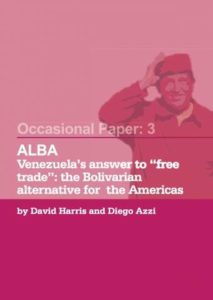23/11/2006
Under: Publications, Trade and Investment
The Bolivarian Alternative for the Americas (ALBA) represents the first attempt at regional integration that is not based primarily on trade liberalization but on a new vision of social welfare and equity. Alternatives are often either theoretical to the point of impracticality, or so micro that scaling up presents huge challenges; ALBA is both large-scale and, to an increasing degree, taking concrete shape. While many aspects of the project are still unrealized or only in the process of realization, and despite some apparent contradictions between theory and practice, ALBA is an important case study.
The fact that ALBA is spearheaded by Presidents Chávez, Castro and, more recently,Morales, of Venezuela, Cuba and Bolivia respectively, the hemisphere’s 3 biggest bogeymen for neoliberal imperialism, only makes the tale that much more interesting. When US President George Bush turns up in Latin America to promote the Free Trade Agreement of the Americas (FTAA), he is routinely cold-shouldered; Chávez on ALBA is greeted like a rock star.
Venezuela’s Answer to “Free Trade”: The Bolivarian Alternative for the Americas (ALBA), by David Harris and Diego Azzi, provides a detailed account, and a critical assessment, of the ALBA project to date.
Work so far has involved an exchange of cheap Venezuelan oil for Cuban doctors and healthcare expertise. This includes ‘Operation Miracle’, which aims to provide free eye operations, plus transportation and accommodation, to 600,000 citizens of Latin America and the Caribbean each year. Bolivia’s recent entry in ALBA agreements saw it gain doctors and teachers, technical assistance for managing its hydrocarbon extraction sector, and a market for its soy beans, while its contribution is mainly in the form of its natural gas reserves.
Harris and Azzi provide a summary historical background to the US economic and political hegemony over the region and compare the ALBA project with other regional integration efforts, namely the South American Community of Nations (CSN), Mercosur, and the FTAA and bilateral Free trade Agreements between the US and various countries in the region. These other efforts either directly support the neoliberal model that perpetuates US regional hegemony, or at best do not question it. ALBA, by contrast, flies in the face of the Washington Consensus. The authors also point out that ALBA, unlike other regional groupings, has so far played virtually no role in international fora such as the WTO or G20.






